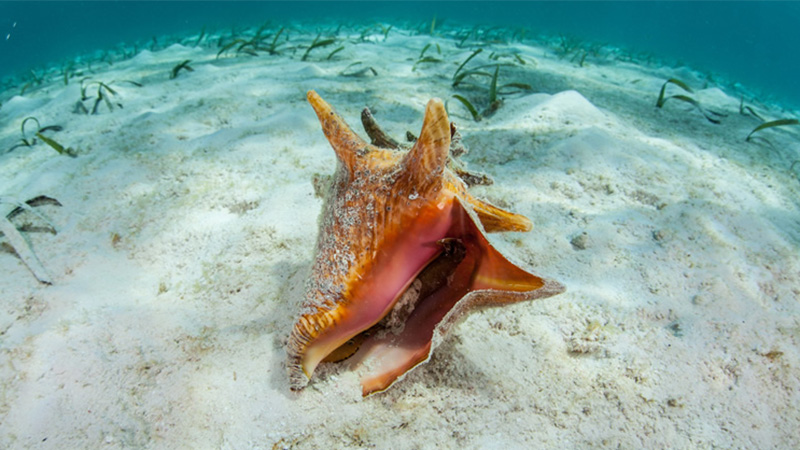Blue BioTrade aims to promote trade and investment in marine biological resources in line with social, economic and environmental sustainability criteria, known as the BioTrade Principles and Criteria (2017 and revised in 2020). Integrating BioTrade principles and criteria into the marine environment can promote the sustainable use of scarce and vital oceanic living resources (at the genetic, species and ecosystem levels) and can lessen the negative impacts of human and economic activity over marine ecosystems. Blue BioTrade is a spinoff of the UNCTAD Oceans Economy and Fisheries Programme and the BioTrade Initiative.
In 2017, at the United Nations Oceans Conference, UNCTAD, the Development Bank of Latin America (CAF), CITES and the International Ocean Institute (IOI) explored the potential of adapting and contextualizing BioTrade principles for use in the marine realm to allow for a value chain, ecosystem-based, and adaptive management approach which promotes conservation and improves livelihoods. Such an event was followed by an in-depth research on how to develop and adapt the Blue BioTrade principles and explore linkages with the oceans economy, trade law and law of the sea.
In 2020, UNCTAD, the Organisation of Caribbean States (OECS) and CITES joined forces to design a pilot project to test the application of the revised BioTrade Principles (2020) into the marine environment. The value chain selected for this pilot project was Queen Conch (an Appendix II CITES-listed species) in the first phase and sea moss and sargassum in the second one. All leading to the design and launching of the project “Seizing the trade and business potential of Blue BioTrade products for promoting sustainable livelihoods and conservation of marine biodiversity in selected Organisation of Eastern Caribbean States (OECS) Countries”. This project is possible thanks to the kind financial support of the OECS and the European Union.
Overview of the issue
Queen conch (Strombus gigas) is a highly appreciated seafood delicacy with important non-food uses, including therapeutical products and handicrafts. While global demand is booming, small-scale coastal producers in the Eastern Caribbean do not fully seize the opportunities offered by sustainable conch markets. In many locations, early uncontrolled harvesting has resulted in overfishing, illegal landings and a rapid deterioration of endowments. Supply-side issues include the absence of traceability systems, limited landing and trade evidence, limited understanding and use of CITES processes and permits, lack of common handling practices and sanitary standards and a low level of associativity of fishers. From a trade perspective, limited access to markets – in particular international buyers - and the absence of certification schemes for producers are major challenges ahead.
Objective
To empower small-scale coastal producers from OECS member states to produce and trade queen conch products in domestic, regional and international markets under the Blue BioTrade environmental, social and economic sustainability criteria, including CITES.
Activities
- Stakeholder mapping
- Blue BioTrade Webinar
- 3 country queen conch product assessments
- Regional Blue BioTrade Workshop
- Regional Blue BioTrade Action Plan
- Dissemination and outreach
Intended Outcomes
Outcome 1: Stakeholders have enhanced capacity to identify sustainable business opportunities and formulate joint actions to apply Blue BioTrade principles in the queen conch value chain.
Outcome 2: Small-scale coastal producers in beneficiary countries benefit from enhanced sustainable production and trade opportunities in the queen conch value chain
Link to the SDGs:
The project will contribute to achieving key targets of Sustainable Development Goals (SDGs) 14 and 12 while also addressing key economic, environmental and social objectives of the OECS Development Strategy 2019-2028 and supporting recovery in a post-COVID-19 scenario.
Monitoring and Evaluation
Two annual reports and one final report. Monitoring on implementation will be done by a Steering Committee composed by the three partners. The project will hire an independent evaluator at the end of the project.
Promoting Blue BioTrade in the Eastern Caribbean
29 June 2022
Blue BioTrade is the sustainable use and trade of marine resources in a way that improves livelihoods while protecting our ocean.
Consultation and validation meeting
Blue BioTrade in Saint Lucia: Developing value for the sustainable trade and production of queen conch in the Caribbean
Saint Lucia
04 November 2021
The Commission of the Organization of Eastern Caribbean States (OECS) in cooperation with the United Nations Conference on Trade and Development (UNCTAD), with support from the Secretariat for the Convention on International Trade in Endangered Species of Wild Fauna and Flora, hosted a stakeholder consultation and validation event for the UNCTAD-OECS Blue BioTrade Project.



